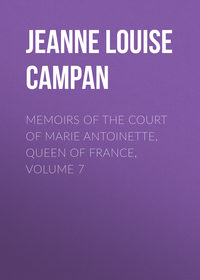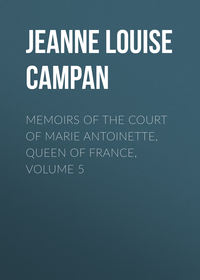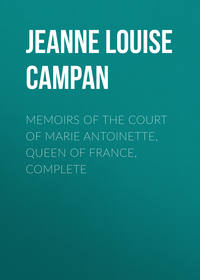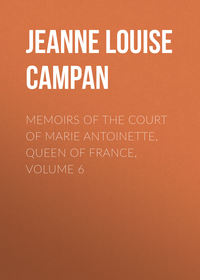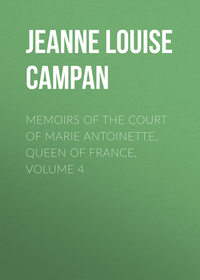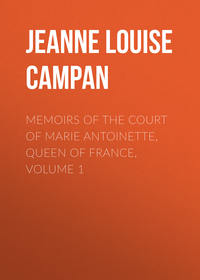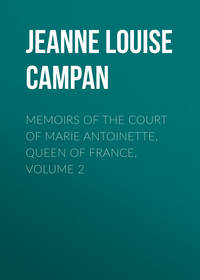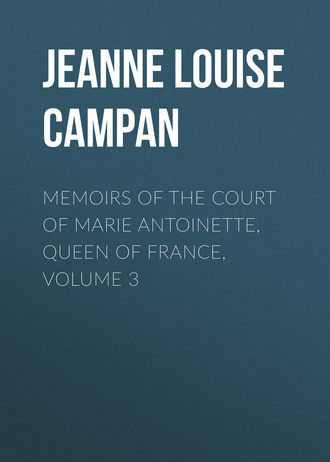 полная версия
полная версияMemoirs of the Court of Marie Antoinette, Queen of France, Volume 3
[The account given by Madame Campan of the Chevalier d'Eon is now known to be incorrect in many particulars. Enough details for most readers will be found in the Duc de Broglie's "Secret of the King," vol. ii., chaps. vi. and g., and at p. 89, vol. ii. of that work, where the Duke refers to the letter of most dubious authenticity spoken of by Madame Campan. The following details will be sufficient for these memoirs: The Chevalier Charles d'Eon de Beaumont (who was born in 1728) was an ex-captain of dragoons, employed in both the open and secret diplomacy of Louis XV. When at the embassy in London he quarrelled with the ambassador, his superior, the Comte de Guerchy (Marquis do Nangis), and used his possession of papers concerning the secret diplomacy to shield himself. It was when hiding in London, in 1765, on account of this business, that he seems first to have assumed woman's dress, which he retained apparently chiefly from love of notoriety. In 1775 a formal agreement with the French Court, made by the instrumentality of Beaumarchais, of all people in the world, permitted him to return to France, retaining the dress of a woman. He went back to France, but again came to England, and died there, at his residence in Millman Street, near the Foundling Hospital, May 22, 1710. He had been a brave and distinguished officer, but his form and a certain coldness of temperament always remarked in him assisted him in his assumption of another sex. There appears to be no truth in the story of his proceedings at the Russian Court, and his appearing in female attire was a surprise to those who must have known of any earlier affair of the sort.]
At last, the event so long desired by the Queen, and by all those who wished her well, took place; her Majesty became enceinte. The King was in ecstasies. Never was there a more united or happier couple. The disposition of Louis XVI. entirely altered, and became prepossessing and conciliatory; and the Queen was amply compensated for the uneasiness which the King's indifference during the early part of their union had caused her.
The summer of 1778 was extremely hot. July and August passed, but the air was not cooled by a single storm. The Queen spent whole days in close rooms, and could not sleep until she had breathed the fresh night air, walking with the Princesses and her brothers upon the terrace under her apartments. These promenades at first gave rise to no remark; but it occurred to some of the party to enjoy the music of wind instruments during these fine summer nights. The musicians belonging to the chapel were ordered to perform pieces suited to instruments of that description, upon steps constructed in the middle of the garden. The Queen, seated on one of the terrace benches, enjoyed the effect of this music, surrounded by all the royal family with the exception of the King, who joined them but, twice, disliking to change his hour of going to bed.
Nothing could be more innocent than these parties; yet Paris, France, nay, all Europe, were soon canvassing them in a manner most disadvantageous to the reputation of Marie Antoinette. It is true that all the inhabitants of Versailles enjoyed these serenades, and that there was a crowd near the spot from eleven at night until two or three in the morning. The windows of the ground floor occupied by Monsieur and Madame—[The wife of Monsieur, the Comte de Provence.]—were kept open, and the terrace was perfectly well lighted by the numerous wax candles burning in the two apartments. Lamps were likewise placed in the garden, and the lights of the orchestra illuminated the rest of the place.
I do not know whether a few incautious women might not have ventured farther, and wandered to the bottom of the park; it may have been so; but the Queen, Madame, and the Comtesse d'Artois were always arm-in-arm, and never left the terrace. The Princesses were not remarkable when seated on the benches, being dressed in cambric muslin gowns, with large straw hats and muslin veils, a costume universally adopted by women at that time; but when standing up their different figures always distinguished them; and the persons present stood on one side to let them pass. It is true that when they seated themselves upon the benches private individuals would sometimes, to their great amusement, sit down by their side.
A young clerk in the War Department, either not knowing or pretending not to know the Queen, spoke to her of the beauty of the night, and the delightful effect of the music. The Queen, fancying she was not recognised, amused herself by keeping up the incognito, and they talked of several private families of Versailles, consisting of persons belonging to the King's household or her own. After a few minutes the Queen and Princesses rose to walk, and on leaving the bench curtsied to the clerk. The young man knowing, or having subsequently discovered, that he had been conversing with the Queen, boasted of it in his office. He was merely, desired to hold his tongue; and so little attention did he excite that the Revolution found him still only a clerk.
Another evening one of Monsieur's body-guard seated himself near the Princesses, and, knowing them, left the place where he was sitting, and placed himself before the Queen, to tell her that he was very fortunate in being able to seize an opportunity of imploring the kindness of his sovereign; that he was "soliciting at Court"—at the word soliciting the Queen and Princesses rose hastily and withdrew into Madame's apartment.—[Soulavie has most criminally perverted these two facts.—MADAME CAMPAN.]—I was at the Queen's residence that day. She talked of this little occurrence all the time of her 'coucher'; though she only complained that one of Monsieur's guards should have had the effrontery to speak to her. Her Majesty added that he ought to have respected her incognito; and that that was not the place where he should have ventured to make a request. Madame had recognised him, and talked of making a complaint to his captain; the Queen opposed it, attributing his error to his ignorance and provincial origin.
The most scandalous libels were based on these two insignificant occurrences, which I have related with scrupulous exactness. Nothing could be more false than those calumnies. It must be confessed, however, that such meetings were liable to ill consequences. I ventured to say as much to the Queen, and informed her that one evening, when her Majesty beckoned to me to go and speak to her, I thought I recognised on the bench on which she was sitting two women deeply veiled, and keeping profound silence; that those women were the Comtesse du Barry and her sister-in-law; and that my suspicions were confirmed, when, at a few paces from the seat, and nearer to her Majesty, I met a tall footman belonging to Madame du Barry, whom I had seen in her service all the time she resided at Court.
My advice was disregarded. Misled by the pleasure she found in these promenades, and secure in the consciousness of blameless conduct, the Queen would not see the lamentable results which must necessarily follow. This was very unfortunate; for besides the mortifications they brought upon her, it is highly probable that they prompted the vile plot which gave rise to the Cardinal de Rohan's fatal error.
Having enjoyed these evening promenades about a month, the Queen ordered a private concert within the colonnade which contained the group of Pluto and Proserpine. Sentinels were placed at all the entrances, and ordered to admit within the colonnade only such persons as should produce tickets signed by my father-in-law. A fine concert was performed there by the musicians of the chapel and the female musicians belonging to the. Queen's chamber. The Queen went with Mesdames de Polignac, de Chalon, and d'Andlau, and Messieurs de Polignac, de Coigny, de Besenval, and de Vaudreuil; there were also a few equerries present. Her Majesty gave me permission to attend the concert with some of my female relations. There was no music upon the terrace. The crowd of inquisitive people, whom the sentinels kept at a distance from the enclosure of the colonnade, went away highly discontented; the small number of persons admitted no doubt occasioned jealousy, and gave rise to offensive comments which were caught up by the public with avidity. I do not pretend to apologise for the kind of amusements with which the Queen indulged herself during this and the following summer; the consequences were so lamentable that the error was no doubt very great; but what I have said respecting the character of these promenades may be relied on as true.
When the season for evening walks was at an end, odious couplets were circulated in Paris; the 'Queen was treated in them in the most insulting manner; her situation ranked among her enemies persons attached to the only prince who for several years had appeared likely to give heirs to the crown. People uttered the most inconsiderate language; and those improper conversations took place in societies wherein the imminent danger of violating to so criminal an extent both truth and the respect due to sovereigns ought to have been better understood. A few days before the Queen's confinement a whole volume of manuscript songs, concerning her and all the ladies about her remarkable for rank or station was, thrown down in the oiel-de-boeuf.—[A large room at Versailles lighted by a bull's-eye window, and used as a waiting-room.]—This manuscript was immediately put into the hands of the King, who was highly incensed at it, and said that he had himself been at those promenades; that he had seen nothing connected with them but what was perfectly harmless; that such songs would disturb the harmony of twenty families in the Court and city; that it was a capital crime to have made any against the Queen herself; and that he wished the author of the infamous libels to be discovered and punished. A fortnight afterwards it was known publicly that the verses were by M. Champcenetz de Riquebourg, who was not even reprimanded.
[The author of a great many songs, some of which are very well written. Lively and satirical by nature, he did not lose either his cheerfulness or his carelessness before the revolutionary tribunal. After hearing his own sentence read, he asked his judges if he might not be allowed to find a substitute.—MADAME CAMPAN.]
I knew for a certainty that the King spoke to M. de Maurepas, before two of his most confidential servants, respecting the risk which he saw the Queen ran from these night walks upon the terrace of Versailles, which the public ventured to censure thus openly, and that the old minister had the cruelty to advise that she should be suffered to go on; she possessed talent; her friends were very ambitious, and longed to see her take a part in public affairs; and to let her acquire the reputation of levity would do no harm. M. de Vergennes was as hostile to the Queen's influence as M. de Maurepas. It may therefore be fairly presumed, since the Prime Minister durst point out to his King an advantage to be gained by the Queen's discrediting herself, that he and M. de Vergennes employed all means within the reach of powerful ministers in order to ruin her in the opinion of the public.
The Queen's accouchement approached; Te Deums were sung and prayers offered up in all the cathedrals. On the 11th of December, 1778, the royal family, the Princes of the blood, and the great officers of State passed the night in the rooms adjoining the Queen's bedchamber. Madame, the King's daughter, came into the world before mid-day on the 19th of December.—[Marie Therese Charlotte (1778-1861), Madame Royale; married in 1799 Louis, Duc d'Angouleme, eldest son of the Comte d'Artois.]—The etiquette of allowing all persons indiscriminately to enter at the moment of the delivery of a queen was observed with such exaggeration that when the accoucheur said aloud, "La Reine va s'accoucher," the persons who poured into the chamber were so numerous that the rush nearly destroyed the Queen. During the night the King had taken the precaution to have the enormous tapestry screens which surrounded her Majesty's bed secured with cords; but for this they certainly would have been thrown down upon her. It was impossible to move about the chamber, which was filled with so motley a crowd that one might have fancied himself in some place of public amusement. Two Savoyards got upon the furniture for a better sight of the Queen, who was placed opposite the fireplace.
The noise and the sex of the infant, with which the Queen was made acquainted by a signal previously agreed on, as it is said, with the Princesse do Lamballe, or some error of the accoucheur, brought on symptoms which threatened fatal consequences; the accoucheur exclaimed, "Give her air—warm water—she must be bled in the foot!" The windows were stopped up; the King opened them with a strength which his affection for the Queen gave him at the moment. They were of great height, and pasted over with strips of paper all round. The basin of hot water not being brought quickly enough, the accoucheur desired the chief surgeon to use his lancet without waiting for it. He did so; the blood streamed out freely, and the Queen opened her eyes. The Princesse de Lamballe was carried through the crowd in a state of insensibility. The valets de chambre and pages dragged out by the collar such inconsiderate persons as would not leave the room. This cruel custom was abolished afterwards. The Princes of the family, the Princes of the blood, the chancellor, and the ministers are surely sufficient to attest the legitimacy of an hereditary prince. The Queen was snatched from the very jaws of death; she was not conscious of having been bled, and on being replaced in bed asked why she had a linen bandage upon her foot.
The delight which succeeded the moment of fear was equally lively and sincere. We were all embracing each other, and shedding tears of joy. The Comte d'Esterhazy and the Prince de Poix, to whom I was the first to announce that the Queen was restored to life, embraced me in the midst of the cabinet of nobles. We little imagined, in our happiness at her escape from death, for how much more terrible a fate our beloved Princess was reserved.
NOTE. The two following specimens of the Emperor Joseph's correspondence forcibly demonstrate the vigour, shrewdness, and originality of his mind, and complete the portrait left of him by Madame Campan.
Few sovereigns have given their reasons for refusing appointments with the fullness and point of the following letter
To a Lady.
MADAM.—I do not think that it is amongst the duties of a monarch to grant places to one of his subjects merely because he is a gentleman. That, however, is the inference from the request you have made to me. Your late husband was, you say, a distinguished general, a gentleman of good family, and thence you conclude that my kindness to your family can do no less than give a company of foot to your second son, lately returned from his travels.
Madam, a man may be the son of a general and yet have no talent for command. A man may be of a good family and yet possess no other merit than that which he owes to chance,—the name of gentleman.
I know your son, and I know what makes the soldier; and this twofold knowledge convinces me that your son has not the disposition of a warrior, and that he is too full of his birth to leave the country a hope of his ever rendering it any important service.
What you are to be pitied for, madam, is, that your son is not fit either for an officer, a statesman or a priest; in a word, that he is nothing more than a gentleman in the most extended acceptation of the word.
You may be thankful to that destiny, which, in refusing talents to your son, has taken care to put him in possession of great wealth, which will sufficiently compensate him for other deficiencies, and enable him at the same time to dispense with any favour from me.
I hope you will be impartial enough to see the reasons which prompt me to refuse your request. It may be disagreeable to you, but I consider it necessary. Farewell, madam.—Your sincere well-wisher, JOSEPH LACHSENBURG, 4th August, 1787.
The application of another anxious and somewhat covetous mother was answered with still more decision and irony:
To a Lady.
MADAM.—You know my disposition; you are not ignorant that the society of the ladies is to me a mere recreation, and that I have never sacrificed my principles to the fair sex. I pay but little attention to recommendations, and I only take them into consideration when the person in whose behalf I may be solicited possesses real merit.
Two of your sons are already loaded with favours. The eldest, who is not yet twenty, is chief of a squadron in my army, and the younger has obtained a canonry at Cologne, from the Elector, my brother. What would you have more? Would you have the first a general and the second a bishop?
In France you may see colonels in leading-strings, and in Spain the royal princes command armies even at eighteen; hence Prince Stahremberg forced them to retreat so often that they were never able all the rest of their lives to comprehend any other manoeuvre.
It is necessary to be sincere at Court, and severe in the field, stoical without obduracy, magnanimous without weakness, and to gain the esteem of our enemies by the justice of our actions; and this, madam, is what I aim at. JOSEPH VIENNA, September, 1787.
(From the inedited Letters of Joseph IL, published at Paris, by Persan, 1822.)
CHAPTER X
During the alarm for the life of the Queen, regret at not possessing an heir to the throne was not even thought of. The King himself was wholly occupied with the care of preserving an adored wife. The young Princess was presented to her mother. "Poor little one," said the Queen, "you were not wished for, but you are not on that account less dear to me. A son would have been rather the property of the State. You shall be mine; you shall have my undivided care, shall share all my happiness, and console me in all my troubles."
The King despatched a courier to Paris, and wrote letters himself to Vienna, by the Queen's bedside; and part of the rejoicings ordered took place in the capital.
A great number of attendants watched near the Queen during the first nights of her confinement. This custom distressed her; she knew how to feel for others, and ordered large armchairs for her women, the backs of which were capable of being let down by springs, and which served perfectly well instead of beds.
M. de Lassone, the chief physician, the chief surgeon, the chief apothecary, the principal officers of the buttery, etc., were likewise nine nights without going to bed. The royal children were watched for a long time, and one of the women on duty remained, nightly, up and dressed, during the first three years from their birth.
The Queen made her entry into Paris for the churching. One hundred maidens were portioned and married at Notre-Dame. There were few popular acclamations, but her Majesty was perfectly well received at the Opera.
A few days after the Queen's recovery from her confinement, the Cure of the Magdelaine de la City at Paris wrote to M. Campan and requested a private interview with him; it was to desire he would deliver into the hands of the Queen a little box containing her wedding ring, with this note written by the Cure: "I have received under the seal of confession the ring which I send to your Majesty; with an avowal that it was stolen from you in 1771, in order to be used in sorceries, to prevent your having any children." On seeing her ring again the Queen said that she had in fact lost it about seven years before, while washing her hands, and that she had resolved to use no endeavour to discover the superstitious woman who had done her the injury.
The Queen's attachment to the Comtesse Jules increased every day; she went frequently to her house at Paris, and even took up her own abode at the Chateau de la Muette to be nearer during her confinement. She married Mademoiselle de Polignac, when scarcely thirteen years of age, to M. de Grammont, who, on account of this marriage, was made Duc de Guiche, and captain of the King's Guards, in reversion after the Duc de Villeroi. The Duchesse de Civrac, Madame Victoire's dame d'honneur, had been promised the place for the Duc de Lorges, her son. The number of discontented families at Court increased.
The title of favourite was too openly given to the Comtesse Jules by her friends. The lot of the favourite of a queen is not, in France, a happy one; the favourites of kings are treated, out of gallantry, with much greater indulgence.
A short time after the birth of Madame the Queen became again enceinte; she had mentioned it only to the King, to her physician, and to a few persons honoured with her intimate confidence, when, having overexerted her strength in pulling lip one of the glasses of her carriage, she felt that she had hurt herself, and eight days afterwards she miscarried. The King spent the whole morning at her bedside, consoling her, and manifesting the tenderest concern for her. The Queen wept exceedingly; the King took her affectionately in his arms, and mingled his tears with hers. The King enjoined silence among the small number of persons who were informed of this unfortunate occurrence; and it remained generally unknown. These particulars furnish an accurate idea of the manner in which this august couple lived together.
The Empress Maria Theresa did not enjoy the happiness of seeing her daughter give an heir to the crown of France. That illustrious Princess died at the close of 1780, after having proved by her example that, as in the instance of Queen Blanche, the talents of a sovereign might be blended with the virtues of a pious princess. The King was deeply affected at the death of the Empress; and on the arrival of the courier from Vienna said that he could not bring himself to afflict the Queen by informing her of an event which grieved even him so much. His Majesty thought the Abbe de Vermond, who had possessed the confidence of Maria Theresa during his stay at Vienna, the most proper person to discharge this painful duty. He sent his first valet de chambre, M. de Chamilly, to the Abbe on the evening of the day he received the despatches from Vienna, to order him to come the next day to the Queen before her breakfast hour, to acquit himself discreetly of the afflicting commission with which he was charged, and to let his Majesty know the moment of his entering the Queen's chamber. It was the King's intention to be there precisely a quarter of an hour after him, and he was punctual to his time; he was announced; the Abbe came out; and his Majesty said to him, as he drew up at the door to let him pass, "I thank you, Monsieur l'Abbe, for the service you have just done me." This was the only time during nineteen years that the King spoke to him.
Within an hour after learning the event the Queen put on temporary mourning, while waiting until her Court mourning should be ready; she kept herself shut up in her apartments for several days; went out only to mass; saw none but the royal family; and received none but the Princesse de Lamballe and the Duchesse de Polignac. She talked incessantly of the courage, the misfortunes, the successes, and the virtues of her mother. The shroud and dress in which Maria Theresa was to be buried, made entirely by her own hands, were found ready prepared in one of her closets. She often regretted that the numerous duties of her august mother had prevented her from watching in person over the education of her daughters; and modestly said that she herself would have been more worthy if she had had the good fortune to receive lessons directly from a sovereign so enlightened and so deserving of admiration.
The Queen told me one day that her mother was left a widow at an age when her beauty was yet striking; that she was secretly informed of a plot laid by her three principal ministers to make themselves agreeable to her; of a compact made between them, that the losers should not feel any jealousy towards him who should be fortunate enough to gain his sovereign's heart; and that they had sworn that the successful one should be always the friend of the other two. The Empress being assured of this scheme, one day after the breaking up of the council over which she had presided, turned the conversation upon the subject of female sovereigns, and the duties of their sex and rank; and then applying her general reflections to herself in particular, told them that she hoped to guard herself all her life against weaknesses of the heart; but that if ever an irresistible feeling should make her alter her resolution, it should be only in favour of a man proof against ambition, not engaged in State affairs, but attached only to a private life and its calm enjoyments,—in a word, if her heart should betray her so far as to lead her to love a man invested with any important office, from the moment he should discover her sentiments he would forfeit his place and his influence with the public. This was sufficient; the three ministers, more ambitious than amorous, gave up their projects for ever.


